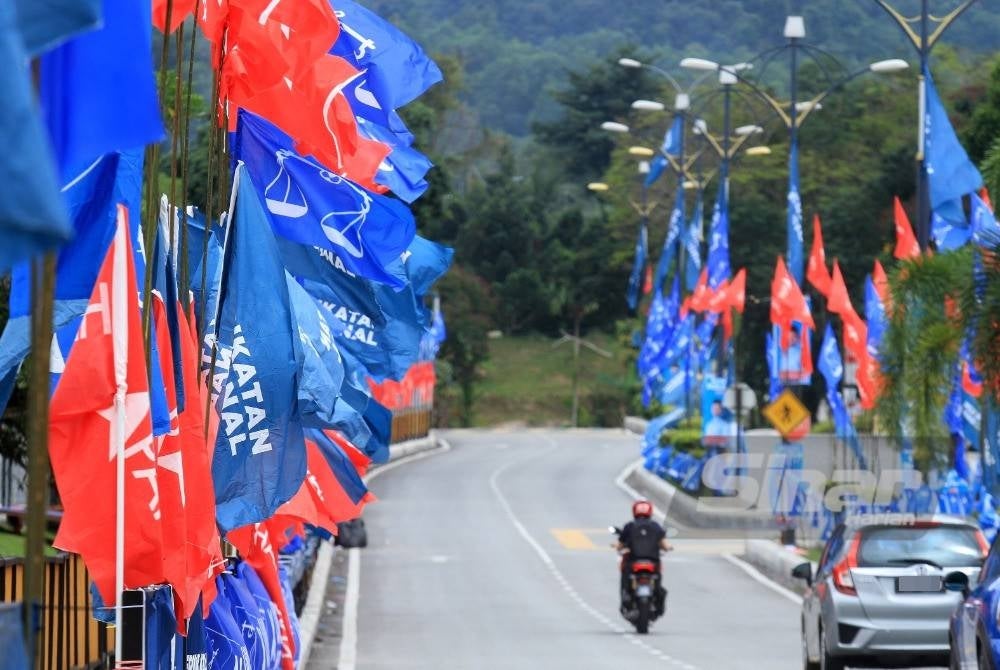Decision on Selangor's fate hinges on control of Malay majority seats
MOHD FAIZUL HAIKA MAT KHAZI
SHAH ALAM - As the state election approaches, Selangor has become a focal point of political discussions.
Many analysts speculate about the potential for a "green wave" from Perikatan Nasional (PN) in the 15th general election (GE15) and its impact on the upcoming state election.
Analysts predict that if there is a significant vote shift, similar to what was witnessed in GE15, and it translates into a re-vote in the state election, PN may have a chance to win Selangor.
Malay majority seats
The Ilham Centre conducted a pre-state election study, revealing that PN could secure victory in 29 out of the 34 state legislative assembly seats with most Malay voters.
A vote shift, particularly among Malays and fence-sitters, would have a more pronounced effect.
Ilham Centre’s executive director Hisommudin Bakar said that the real competition in the state election is between the Malay parties of the Pakatan Harapan (PH)-Barisan Nasional (BN) coalition and PN.
The focus is securing the majority of Malay votes in the 34 state seats where Malays comprise over 60 per cent of the electorate.
Hisommudin noted that it would not be surprising if Bersatu president Tan Sri Muhyiddin Yassin expressed confidence in PN's ability to take over the Selangor government if they can secure 70 to 80 per cent of the Malay votes in the 34 state seats.
"If the voter turnout is around 60 per cent and the Malay community provides solid support, it is not impossible for PN to achieve 75 to 80 per cent of the vote, resulting in an easy majority and victory in 29 or 30 Selangor state seats.
"PN's target is realistic and should not be underestimated by the PH-BN coalition," he told Sinar Premium.
According to Hisommudin, the main challenge for PH-BN is to prevent a large-scale "green wave" or a surge of Malay voters supporting PN, exceeding 70 per cent in the Selangor state election.
This wave symbolises the referendum of Malay voters regarding their choice of Malay party to support.
He believes that three main issues will impact voting patterns in Selangor: frequent water supply cuts, flood problems, and the high cost of living that affects the urban poor.
However, Hisommudin noted that the statement by Selangor PH election director Mohd Yahya Mat Sahri, claiming that PH can win up to 51 out of 56 Selangor state seats in the polls, is less realistic.
He believes that the comparison between the number of votes obtained by PH and BN in GE15 oversimplifies the analysis, as state elections have different dynamics and typically lower voter turnouts.
Three determining factors
Meanwhile, Universiti Teknologi Mara (UiTM) Center for Media and Information Warfare Studies security and political analyst Dr Noor Nirwandy Mar Noordin believes that the decision of whether PN or the PH-BN coalition will come to power in Selangor depends on which party will control the 34 Malay majority seats.
Noor Nirwandy highlighted the importance of political stability under the coalition government led by Datuk Seri Anwar Ibrahim, which is increasingly recognised by Malaysians.
Additionally, the decision-making process of young voters and those on the fence in the 34 Malay majority seats will play a crucial role in determining the outcome.
“The second factor affecting the victory of PN or PH-BN in Selangor is the change in the support of pattern of the young voters and on the fence in the 34 Malay majority seats, whether they will follow the trend during the last GE15 or they now have the majority to judge what is better for the country in terms of political stability and economic progress.
"The third factor is the popularity of the leader of the candidate who will be featured in the 34 Malay majority state seats.
"If any candidate is seen to be able to win and has potential and is given a mandate because they are certified to be able to carry out work well, then they will get the attention of the community,” he said.
Noor Nirwandy said that the three factors are justification among voters in the 34 Malay majority seats, which are expected to be fiercely contested between PH-BN and PN, while the other 22 mixed state seats are expected to remain PH’s.
Therefore, he said the parties from the unity government need to multiply their efforts and provide the best service so that the people can vote based on political stability and maturity and not based on emotions and excitement.
"We also expect the competing parties to be able to highlight the best manifesto for the community in the hope that the state election this time will be enriched with mature political propaganda, focusing on the strengths of their respective component parties,” he said.
He also hopes that there will be no more character assassination and elements of political bigotry such as the use of religion, royalty and race or 3R issues in the next state election campaign.
“Political parties also need to focus on the issue of socio-economic development and not politicise useless matters in the state election this time.
"Malaysians are fed up with personal politics because Malaysians want the best leader to represent them,” he said.
Even so, reading the thoughts and tastes of Selangor Malay voters takes work.
This is because education, openness, racial integration and living in the city give Malay voters different political tastes.










